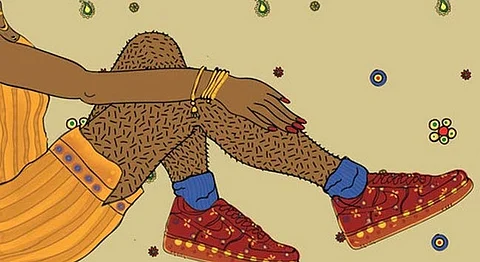
- HOMEGROWN WORLD
- #HGCREATORS
- #HGEXPLORE
- #HGVOICES
- #HGSHOP
- CAREERS
- ABOUT US
- CONTACT US

Last year we saw the resurgence of the body hair-activism and the anti-patriarchy debate make its way into the feminist discourse with growing depictions of this voluminous reality in the artistic world. Works of artists like Polly Nor and Carol Rossetti for example, have had subversive takes on a number of issues that come under the umbrella of modern feminism and have opened up a public dialogue on things long left unquestioned. From multi-coloured armpit snapshots to prickly black stubbly legs, more and more women, artists or otherwise, are openly and vocally trying to change the way society perceives body hair on women. Amongst them is 20-year-old digital illustrator and photograph Ayqa Khan who through her body of work explores women in their natural, biological state in an east-meets-west multicultural aesthetic style.
Women of colour often have naturally darker and more visible hair; for a young Ayqa, being of South Asian descent, growing up surrounded by fair-skinned light-haired people was not easy. Her illustrations were an outlet for her frustration and through them she hopes to bring light to the fact that "body hair is natural and removing it is a social construct that should not be mandatory,” as stated to The Huffington Post. She adds: “My intentions are to normalise it ... because it is something that shouldn't be a huge deal considering body hair is natural and the removal of it is a social construct, yet the judgement and pain that comes with having body hair is one that is harmful and needs to be stopped.”
With traditional motifs and pop-culture imagery, Ayqa’s work speaks loudly through bold colour blocking and eye-catching contrasting patterns. “I am intrigued by youth culture and interactions – on a psychological level. I am very inspired by my own south Asian culture along with the meshing of today’s American culture in regards to lifestyles. My goal is to combine all of these aspects to project a bigger picture as to what I experience being a first-generation south Asian American, and also just a young female trying to understand where my place is in this,” she says to Dazed. She shows images of beautiful women who have body hair in places that are otherwise deemed socially unacceptable and undesirable. With her attention to detail, bold display of body hair on women that we don’t usually see in commercial mainstream media, and seamless mixing of different art mediums and cultural influences, it’s no surprise that she has taken the art world by storm, online and off the internet. She calls herself an "artist from the Internet," as The Huffington Post writes, with a beautiful selection of her work on her website and Tumblr page where she regularly interacts with her online audience, many of them congratulatory comments and expressions of gratitude, as well as bravely facing criticism and the usual online trolling.
“My mother owns a beauty salon where she has made me get waxed ever since I was about 11 because she thought that the hair that was given to my body was “unfeminine”. What bothered me the most was not the pain of getting waxed, but the idea that she thought something natural about me was “gross”. I felt looked at as an object, rather than a HUMAN. People from my school would stare at my thick arm hair in disgust really. And yes, this made me feel really insecure and unworthy,” she writes on her Tumblr. Further adding: “When a person is constantly experiencing situations like this, it’s harmful to their mental health. Social constructs are really tough to talk about because for the most part, everything can be linked to an opinion and what are opinions really? There isn’t much fact that goes into the making of social constructs but there IS fact in the effects of social constructs. It is important for me to recognize the pain and harm that comes with such constructs. There are many issues that society is fighting for in regards to woman, and at this point in my life, I am choosing to focus on creating a space of acceptance.”
In an arena that’s devoid of any real presence of South Asian artists, Ayqa strives to create a space for herself and other female artists of colour without the stereotypes and tokenism. “South Asian woman do not get enough representation in most spaces and I feel the need to express this in an organic way. A lot of representation toward South Asian culture, especially in media, tends to be very one-sided and stereotypical and these views aren't entirely accurate...when it comes to appearances, fairer South Asian woman with European features are chosen to represent us.”
Ayqa’s struggles with multiculturalism and body image issues are a reality for countless young women around the world which is what has made her work so relatable and garnered her a large and supportive following. Her work has become a part of a much larger and highly debated campaign of feminist activism through body hair as a rejection of patriarchy's creation of an idealised female image. What we love about her work is that despite having the following subject matter, it’s without judgement and demonising of women who by their own choice and preference get body hair removed. She has opened up a space for conversation about a variety of female modalities questioning the popularly glamorized notions of femininity, calling attention to its harmful effects on women of all ages and creating acceptance for things most natural.
Words: Sara Hussain
